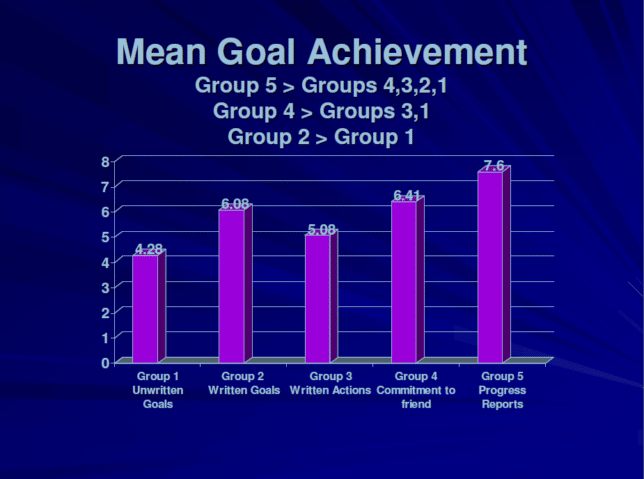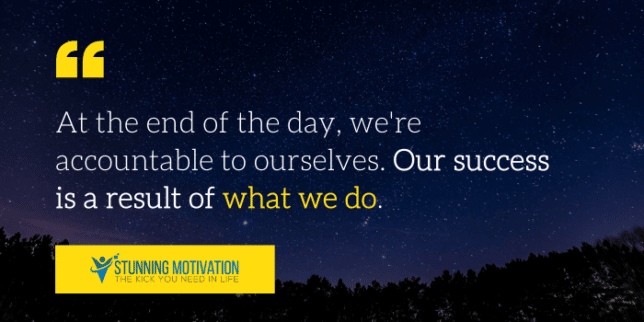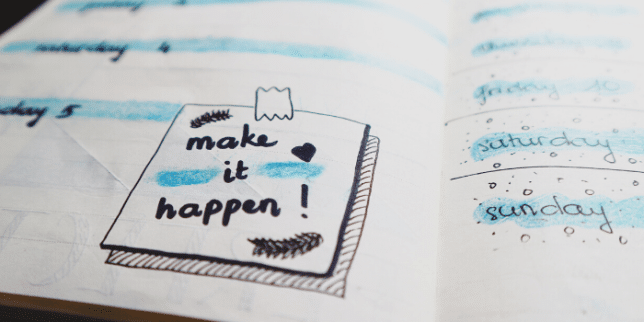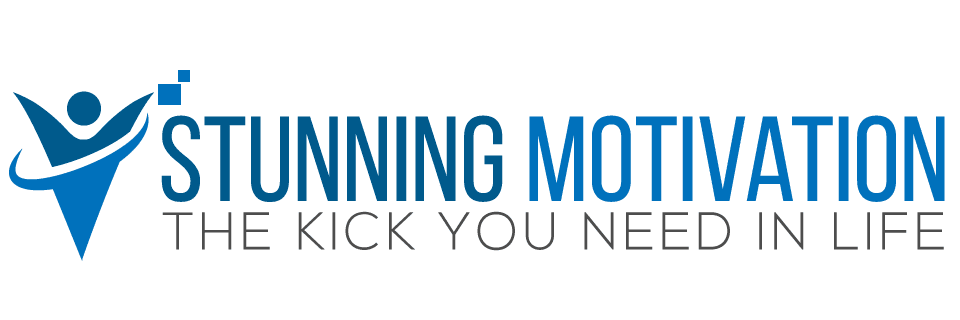We all have been there. We set goals, we dream about them, and we feel good about them, but we just don’t follow through. We lack the accountability to make things happen. So, how do you hold yourself accountable? We’re going to find out in this guide.
My friend, lack of accountability is one of the main reasons people fail to reach their goals.
When you don’t hold yourself accountable for your goals, most likely, you will never do anything about them.
When there is a choice to choose between watching the TV or working on your goals, you’d choose to watch the TV, almost every time.
This is why most people choose to spend time on social media and play games rather than spending time building their blogs or business and pursuing their goals.
They prefer to do the easy things that are fun than to work on their goals that may not be fun at the moment, but the future reward is great.
This is what happens when people lack accountability.
When you don’t have the accountability, you become less committed.
And we all know what happens next. We choose to procrastinate on our goals. We delay the work that we are supposed to get done. We choose to put our goals and dreams to a later date.
Research Shows How Accountability Increases Your Goals Achievement Rate by 76%
Dr. Gail Matthews is a professor from the Dominican University of California. And she has conducted a very interesting study about goal setting and what makes people achieve their goals while others fail to do so.
Dr. Matthews recruited a total of 267 participants from all sorts of working-class, from businesses, organizations, and also networking groups. And the participants came from around the globe, including the United States, Belgium, Australia, Japan, and England. And they are from a variety of industries, such as educators, artists, bankers, marketers, managers, directors, etc.
And the participants were then randomly assigned into 5 different groups:
Group 1: Unwritten Goal
Participants in Group 1 were asked to just think about their goals (what they wanted to accomplish in the next 4 weeks).
Group 2: Written Goal
Participants from Group 2 to Group 5 were asked to write down their goals.
Group 3: Written Goal + Action Commitment
Participants in Group 3 were also asked to formulate their action commitments
Group 4: Writen Goal + Action Commitment to a Friend
Participants in Group 4 were asked to formulate their action commitments and send their goals and action commitment to a supportive friend.
Group 5: Written Goal + Action Commitment + Progress Report to a Friend
Participants in this group were asked to formulate action commitments, and then send their goals, action commitments, and weekly progress report to a supportive friend.
Now, I’m sure you are curious about the conclusion of the study. Here’s the result from Dr. Matthews’ study…

As you can see from the graph above, when people write down their goals, they greatly increase their chances of achieving their goals.
And the most significant result happened to the participants in Group 5.
As high as 76% of all the participants in Group 5 successfully achieved their goals.
So, what did Group 5 did differently? Well, they write down their goals, formulate action commitments, and then send their goals, action commitments, and a weekly progress report to a supportive friend.
Here’s the conclusion from Dr. Gail Matthews’ study:
The positive effect of accountability was supported: those who sent weekly progress reports to their friend accomplished significantly more than those who had unwritten goals, wrote their goals, formulated action commitments or sent those action commitments to a friend.
Conclusion from Dr. Gail Matthews’ goals study.
Why You Need to Hold Yourself Accountable to be Successful

When you hold yourself accountable, you are making the decision and telling yourself that you will accept nothing less than what you have committed.
You do what you say you’ll do. You don’t just say or think about it. You follow up your commitment with actions. That’s accountability.
When you share your goals and action commitments with someone else, you are telling the world and everyone else that achieving your goal is your #1 priority.
In other words, you are putting yourself on the line. You know that when you share your goal with someone, you are making a public commitment.
And yes, you may feel a little bit stressful and a little bit of fear and think, “What if I fail to achieve my goal?”
However, this feeling can also work as a drive to motivate you to work harder, to commit, and to do whatever you can to reach your goal.
Ever wonder why most successful businesses started with partners or friends?
- Steve Jobs started Apple with Steve Wozniak and a bunch of other friends.
- Phil Knight, the creator of Nike started with his running coach, Bill Bowerman.
- The same thing goes to Microsoft. In 1975, Paul Allen was the one who initiated the idea of Microsoft to Bill Gates.
You must hold yourself accountable if you want to achieve extraordinary success in life.
Without someone or some kind of a system to ‘monitor’ your progress, you will never do it when things become tough.
For example, if you have committed to getting up at 6 AM to workout in the gym by 7AM tomorrow. When the alarm goes off at 6 AM, you get up and it is raining outside, what do you do?
Most people will choose to continue to sleep because it is too tempting to leave their warm and comfortable bed.
But if your coach is waiting for you in the gym, do you think you’ll continue to sleep more?
You know the answer.
This is why holding yourself accountable for your goals is important. And here are 7 ways how you can increase your accountability to your goals…
1. Create a work schedule and stick to it

Don’t just say that you want to achieve your goal, create a work schedule or a plan to get there.
You must state it clearly how to do it and when to do it so that you can give your mind clear instructions on what needs to get done.
There was a flu shot study done by researchers and they discovered that when people wrote down the specific date and time when they planned to get their flu shot, they were more likely to follow through.
Thus, don’t just say that you want to lose weight and exercise more. Create a plan. Make a schedule.
State it clearly when and how you’re going to do it.
For instance, you can write down your plan:
- I will workout in the gym for 45 minutes every Tuesday and Thursday from 8 AM.
- I will write a 1,000 words article for my blog every day, at 9 AM.
When you state your intention clearly, you are giving your mind a specific instruction of what you need to do.
And when the time comes, your mind will remind you and put you into action.
Read: How to Turn Your Goals into Actionable Plans
2. Involve an accountability partner

Like I said above, almost all successful people started with someone else. They don’t do it alone.
Dr. Gail Matthews’ study also found that when you share a weekly progress with a supportive friend, you increase your chances of achieving your goals as high as 76%.
This because when you have someone to work together on a common goal, not only that it is more fun, but you can motivate and encourage each other when the tough times come.
So, who is your partner? Who is the one that will support you, encourage you, and motivate you to continue to make progress to achieve your goal?
Now, your accountability partner doesn’t need to be someone knowledgeable or someone who is more successful than you, he can be anyone as long as he is willing to support you and hold you accountable on your progress.
If you’re a solopreneur like me, get a close friend or your spouse to be your accountability partner.
Hence, share your weekly progress with a partner. If you are serious about achieving your goals and making your dream a reality, find yourself an accountability partner, now.
3. Get yourself a coach or a mentor

Another way to make sure that you hold yourself accountable to your goals is to get yourself a coach or a mentor.
If you look at the sports industry, every successful athlete has a coach and sometimes, a few coaches.
This is what you need to do too.
Your coach or mentor does not only hold you accountable, he or she can accelerate your success by identifying your weaknesses and strengths, and also helping you focus on the right things to do.
This article from Forbes shared the importance of getting yourself a mentor or a coach:
- You can get clear with your goals and what you really want to achieve.
- You are able to identify the blind spots and produce better results.
- You become more accountable because your coach will keep you on track.
- You become better as your coach train and build you into the right person worthy of success.
- You boost your engagement with your work and feel happier.
So, if you are able to get a coach or a mentor to guide you and hold you accountable, by all means, do so.
And if you have no idea where to start, read this article.
4. Review and record your goals every day

How often do you review your goals? When was the last time you look at your goals, visualize their achievement, or write them down again?
We all know that success doesn’t come to us accidentally. It is by designed. And one of the most important keys to success is to program your goals into your subconscious.
You want to constantly think about your goals. You want to make your goals a part of your life.
Remember this, when your goals are out of your mind, you will never do anything about them.
You can never take action and act on something that is not in your mind. Therefore, you have to consistently condition what you want into your mind.
This is why you have to review your goals and write them down on a daily basis.
It’s easy to understand, you don’t want to lose your focus on your goals, right? Then you must review them constantly.
Read: The Importance of Daily Goal Setting And How To Do It
Tony Robbins said it wisely, “Repetition is the mother of all skill.”
If you want to improve your free throws skill in basketball, what will you do? You practice it every day, right?
The same goes for holding yourself accountable for your goals. You review your goals daily. You remind yourself of what you need to do until it’s not an option not to do it.
You make your goals your #1 priority by giving it the focus they require.
5. Build a supportive environment

Do you know that the environment you’re in can affect your level of commitment and impact your accountability too?
When you switch your environment, your mood changes too.
Like when you get to the office, you’ll know that it’s time to work. But when you get back home, you’ll put yourself in a more relaxed mood and you don’t want to talk so much about your work.
This is why people go to the gym to workout. They know that it is difficult to workout in their house, even if they have all the equipment.
When you change to your sports attire and get in the gym, and when you see many others are also working out there, it makes you want to exercise along too. The sound and the environment boost your drive to want to exercise and sweat.
But when you’re at home, you feel less tense. The comfortable couch and TV are there. These triggers make you want to procrastinate and distract you from doing what you want.
So, it is obvious. If you want to hold yourself accountable for your goals, create an environment that will support you.
I’m a full-time blogger and I can work from anywhere. But sometimes, I do find it extremely hard to stay focused when I’m at home. This is why I rented a co-working space. And whenever I need the motivation to work, I will just go to the office and work there.
So, how can you build a supportive environment that triggers you to work? Check out this guide below:
10 Tips How to Change Your Environment for Greater Motivation
6. Create a measurement system and track your progress

One of the best ways to maintain your momentum and to boost your accountability is to create a measurement and tracking system for your progress.
You see, if you want to lose weight and you commit to exercising every day, but if you’re not measuring your weight and you can’t tell if you are making any progress, you will soon lose the momentum.
When you don’t know where you stand or if you are making any progress, you are not holding yourself accountable.
So, create a big scoreboard to measure your progress. When you can see your performance and you know whether you are winning or losing, you turn the competition on.
Read: How to Measure Your Progress to Effectively Achieve Your Goals
Plus, when you put up a scoreboard, you are letting others see your progress. There will be no hiding.
People can tell if you are working on your goals or not. People can see if you are making progress to reach your goals or not.
This is why having a scoreboard to measure your progress is important.
Imagine you’re playing a basketball game without keeping score. It doesn’t matter which player scores and you can’t tell if your team is winning or losing. What do you think will happen?
You’ll quickly lose the motivation to want to win. You’ll never know if you are making progress. A match will quickly become a practice. There will be no game because there is no accountability at all.
When people don’t keep score, they will never treat the game seriously. After all, there is no keeping score, so why go all out and play at their best, right?
So if you want to win at the game of your goals, make it a competition.
Create a scoreboard, measure your results and track your progress, got it?
Check out: 10 Effective Action Plan Templates You Can Use Now
7. Create a challenge and put yourself in a situation where you can’t lose

Imagine when you’re in your schooling days, you hate to do the homework, right? But you’d still submitted your homework before the deadline, most of the time, right?
And why was that? Well, the deadline is definitely one crucial factor that helps you get the homework done on time, but there is another more important key that holds you accountable – the punishment.
In school, children do the homework to avoid punishment. At work, you complete your task so that your boss will not screw you.
You’re motivated to do the work because you want to avoid the pain.
On the contrary, there are also times when you feel motivated to do the work. You feel challenged and you’re looking forward to get the work done because of the rewards that are waiting you.
For some people, they’d do the homework because they love it. And some are able to wake up early and exercise for an hour every day because they love it and they’re passionate about it.
You’re doing things to either avoid the pain or to gain the pleasure.
“The secret of success is learning how to use pain and pleasure instead of having pain and pleasure use you. If you do that, you’re in control of your life. If you don’t, life controls you.”
Tony Robbins
Hence, what you can do is create a challenge and put yourself in a situation where you must win.
For example, make a bet with your partner that if you fail to stick to your plan to achieve your goal, you’re going to give him $50. That creates pain.
If you fail to write 1,000 words before lunchtime, you will never have the lunch break. Instead, you will have to work on the article until it is completed before you can take your lunch.
If your goal is to lose 10 pounds, challenge yourself that if you fail to achieve the result, you will go vegan for 10 straight days.
These are just examples. The point is that you want to put yourself in a situation where you cannot retreat.
Use the urge to avoid pains to motivate you.
And similarly, you can use rewards to boost your motivation and get things done.
For instance, you can allow yourself to play computer games if you finish your work by 3 PM. The key is to choose a reward that you look forward to achieving.
Therefore, create a challenge. Leverage the twin forces of pain and pleasure to hold yourself accountable.
Read: How to Reward Yourself for Your Hard Work and Effort
Conclusion
Without accountability, there is no way you can achieve greatness in life. If you want to produce outstanding results and achieve all the goals that you set, you have to hold yourself accountable.
Use the 7 methods above and create a life worth living.
Yes, it is not easy to achieve extraordinary success in life, but it doesn’t mean it is impossible.
Here’s another great article you should check out:
10 Great Tips How to Discipline Yourself to Achieve More



[…] this is why you need to create an accountability system so that you will never procrastinate on doing […]
[…] the same time, you will need to create accountability by sharing your goals and progress so that others can know what you have […]
[…] you want to learn more about holding yourself accountable, read this article here. In the article, I shared the 7 easy methods of how you can hold yourself accountable so that you […]
[…] 7 Easy Ways How to Hold Yourself Accountable for Your Goals […]
[…] 7 Easy Ways How to Hold Yourself Accountable for Your Goals […]
[…] 7 Easy Ways How to Hold Yourself Accountable for Your Goals […]
[…] Read: 7 Easy Ways How to Hold Yourself Accountable for Your Goals […]